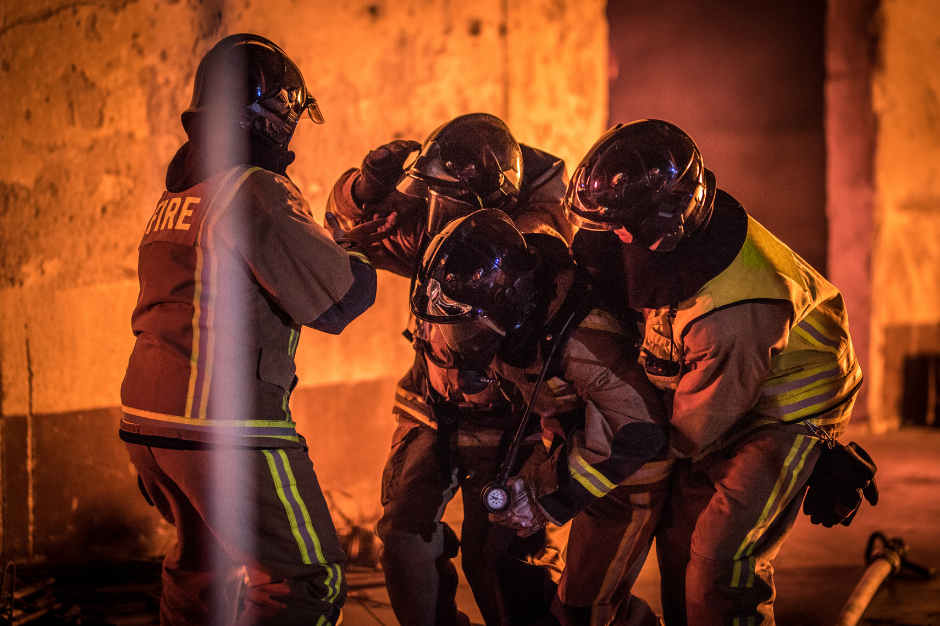Firefighting is a profession that demands physical endurance, mental resilience, and a commitment to facing danger head-on. While the heroism of firefighters is widely recognized, the common injuries and risks they encounter every day often go unnoticed. Understanding the common causes of firefighter injuries is crucial for prevention, awareness, and ensuring that those who protect us receive the support they need.

Overview of Firefighter Injuries
Firefighters can be injured not only while running into a burning building but also during other duties, such as training activities.
- 42% occurred at the fireground
- 21% occurred at non-fire emergency incidents
- 16% occurred during other on-duty activities
- 14% occurred during training activities
- 8% occurred while responding to or returning from an incident
Additionally, injuries to career firefighters were more likely to occur in mid career between the ages of 40 to 44. Injuries are also more common in the months of July and January, according to studies.
8 Most Common Causes of Firefighter Injuries
The brave men and women who serve their community as firefighters face several hazards a day, any of which can cause injury. Here are the most common causes of firefighter injuries according to the U.S. Fire Administration in 2017.
1. Overexertion and Strain (29%)
Firefighters routinely lift heavy equipment, carry people to safety, and work in extreme conditions. This level of physical activity often leads to muscle strains, sprains, and joint injuries, especially in the back and shoulders. Overexertion remains the leading cause of non-fatal injuries among firefighters.
2. Falls, Jumps, and Slips (20%)
Navigating smoke-filled structures, icy sidewalks, or uneven terrain during emergencies increases the risk of slips and falls. Whether jumping from a ladder or tripping over debris, these incidents can result in broken bones, head injuries, or torn ligaments.
3. Contact with Objects (11%)
Falling ceilings, collapsing walls, or even contact with sharp tools can result in blunt force trauma, lacerations, and contusions. In rapidly changing fireground conditions, physical contact with unstable structures or equipment is a common and serious hazard.
4. Exposure to Fire Products (11%)
Even with top-of-the-line gear, firefighters face exposure to extreme heat, flames, and smoke. This can lead to burns, smoke inhalation, and long-term respiratory issues. The effects may not be immediately apparent, but the long-term health risks are very real.
5. Struck by an Object (6%)
Explosions, falling trees during wildfires, or moving vehicles at a scene can result in firefighters being struck by objects. These incidents are unpredictable and can cause head trauma, internal injuries, or even fatalities if the impact is severe.
6. Exposure to Chemicals or Radiation (4%)
Firefighters often respond to industrial fires or hazardous material spills, leading to chemical burns or toxic exposure. Some of these substances may not show health effects immediately but can cause chronic illnesses like cancer or respiratory disease over time.
7. Extreme Weather Conditions (3%)
Responding to calls during snowstorms, floods, or extreme heat can lead to frostbite, hypothermia, heat exhaustion, and other weather-related injuries. Harsh environmental conditions only add to the already demanding nature of the job.
8. Motor Vehicle Accidents (2%)
Responding to emergencies means traveling at high speeds under pressure. Vehicle crashes, whether in fire trucks or personal vehicles en route to a call, are a major source of firefighter injuries and even fatalities. Road conditions, poor visibility, or distracted drivers can all play a role.
Legal Support for Injured Firefighters in Illinois
At Duda Law Firm, we recognize the sacrifices and challenges faced by firefighters. If you’ve sustained an injury in the line of duty, it’s vital to understand your rights and the compensation available to you.
Our experienced team is here to provide guidance, support, and dedicated legal representation to ensure you receive the benefits you deserve.
Contact us today or call (847) 577-2470 for more information or to schedule a FREE consultation.
